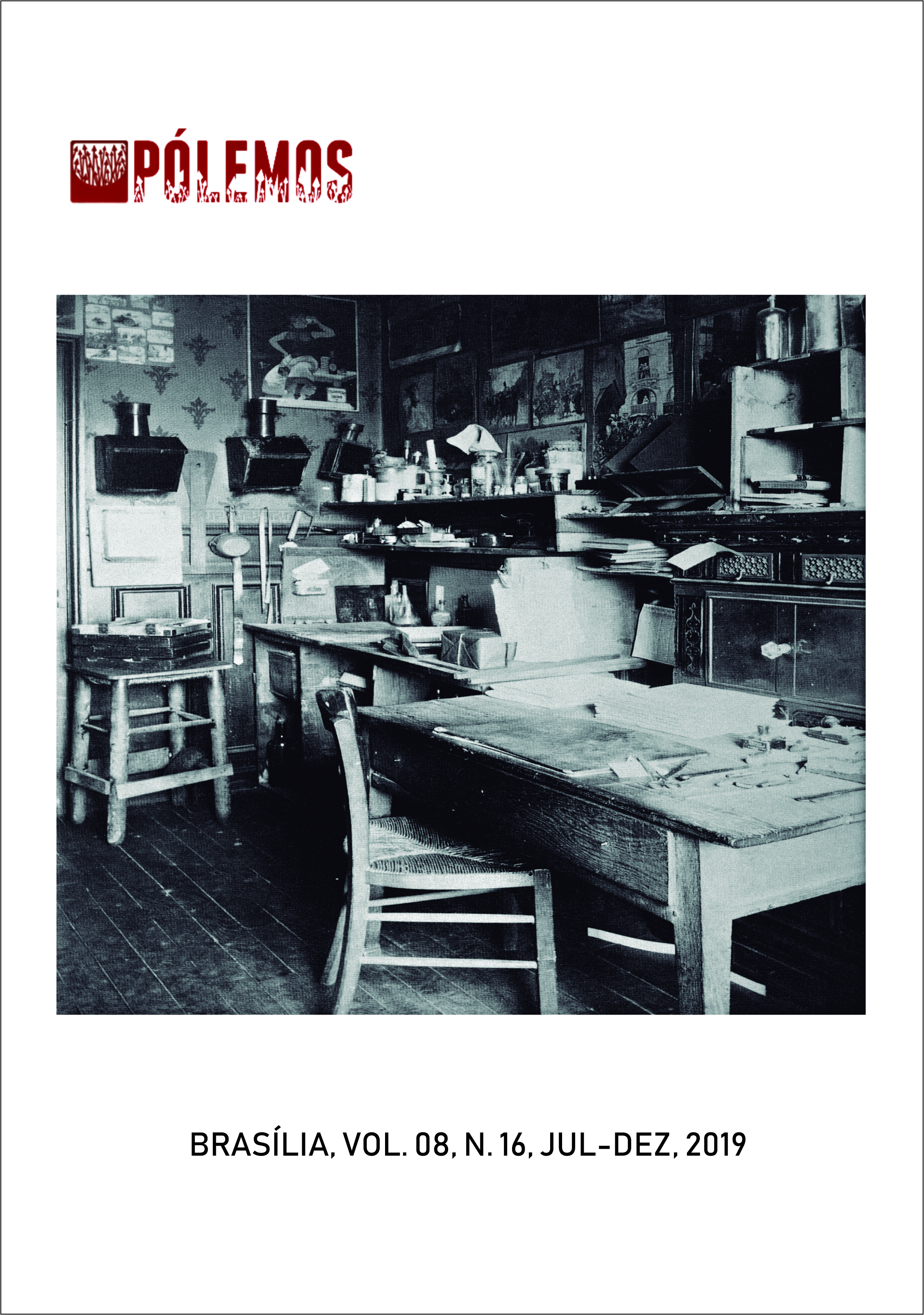O PRINCÍPIO DA INÉRCIA É RELATIVAMENTE/FUNCIONALMENTE A PRIORI?
aspectos constitutivos do conhecimento científico e a teoria funcional do a priori
DOI:
https://doi.org/10.26512/pl.v8i16.26983Palavras-chave:
Filosofia da Ciência. A Priori Relativizado. Teoria Funcional do A Priori. Michael Friedman. Arthur Pap.Resumo
Neste artigo, busca-se uma reconstrução racional e apropriação crítica da caracterização feita a partir da teoria funcional do a priori de Arthur Pap (1943, 1944 & [1946] 1968) do status ou estatuto epistêmico do princípio da inércia. O principal objetivo é revitalizar o autor, que permaneceu marginal em um debate em relação ao qual sua obra se mostra fecunda. Para tal propósito, a teoria funcional do a priori é apresentada em linhas gerais e é apresentado também o debate em torno do qual se caracteriza o conhecimento dos princípios mais basilares das ciências naturais como relativamente/funcionalmente a priori. Após a apresentação de seu pano de fundo, o princípio da inércia é caracterizado a partir da concepção funcional do a priori de modo contextual: no contexto em que o princípio da inércia é tomado como critério para determinar o “movimento real” de objetos, a física newtoniana, ele é conhecido a priori. No sentido de condição de acesso cognitivo ou inteligibilidade, portanto, ele funciona como se fosse a priori (é constitutivo dos objetos conhecidos).
Downloads
Referências
BLAND, S. (2011) Schlick, conventionalism, and scientific revolutions. Springer, DOI 10.1007/s12136-011-0131-3.
BOCCALETTI, D. (2016) Galileo and the equations of motion. Springer International Publishing.
BROWN, J. R. (1986) Thought experiments since the Scientific Revolution. International studies in the Philosophy of Science, 1:1-15.
CREATH, R. (2010) The construction of reason: Kant, Carnap, Kuhn, and beyond. In: Discourse on a new method: reinvigorating the marriage of history and philosophy of Science. M. Domski and M. Dickson (ed.). Chicago and La Salle, IL: Open Court. p. 493-509.
DIPIERRES, G. (1992) The constitutive a priori. Canadian Journal of Philosophy (supl.), v. 18, p. 179-214.
FRIEDMANN, M. (1999) Reconsidering logical positivism. Cambridge: Cambridge University Press.
FRIEDMANN, M. (2001) Dynamics of reason: the 1999 Kant lectures at Stanford University. Stanford: CSLI Publications.
FRIEDMANN, M. (2002) Kant, Kuhn and the rationality of science. Philosophy of science, v. 69, p. 171-190.
FRIEDMANN, M. (2010) Synthetic history reconsidered. In: Discourse on a new method:
reinvigorating the marriage of history and philosophy of science. M. Domski and M. Dickson (ed.). Chicago and La Salle, IL: Open Court. p. 571-813.
FRIEDMANN, M. (2011a) Extending the dynamics of reason. In: Erkenntnis, v. 75, n. 3, p. 431-444.
FRIEDMANN, M. (2011b) Reconsidering the dynamics of reason: response to Ferrari, Mormann, Nordmann, and Uebel. In: Studies in history and philosophy of science, v. 43, p. 43-57.
GOODMAN, N. (1983) Fact, fiction and forecast. Cambridge, MA: Harvard University Press.
GREENE, B. (2004) The fabric of the cosmos: space, time, and the texture of reality. New York, NY: Random House.
HANSON, N. R. (1965) Newton’s First Law: a philosopher’s door into Natural Philosophy. In: Beyond the edge of certainty: essays in contemporary science and philosophy. R. G. Colodny (ed.). Englewood Cliffs, NJ: Prentice Hall. p. 6-28.
HUFFERMANN, J. D. O estatuto epistêmico dos elementos constitutivos da ciência. In: Anais da XVI Semana Acadêmica do PPG em Filosofia da PUCRS. Porto Alegre: Editora Fi, 2016, v. 1, p. 210-229.
KEUPINK, A & SHIEH, S. (2006) The limits of logical empiricism – selected papers of Arthur Pap. Springer Netherlands: Synthese Library.
KUHN, T. S. (2000) The road since structure: philosophical essays, 1970-1993, with an autobiographical interview. Chicago, IL: University of Chicago Press.
KUHN, T. S. (2012) The structure of scientific revolutions, 50th anniversary edition. Chicago, IL: University of Chicago Press.
NORTON, J. D. (1993) Seeing the laws of nature. Metascience, 3:33-38.
PAP, A. (1943) On the meaning of necessity. Journal of philosophy, v. 40, n. 17, p. 449-458.
NORTON, J. D. (1944) The different kinds of a priori. The philosophical review, v. 50, n. 5, sept. 1944, p. 465-484.
NORTON, J. D. ([1946] 1968) The a priori in physical theory. New York: Russell & Russell.
PSILLOS & CHRISTOPOULOU. (2009) The a priori: between conventions and implicit definitions. Kompa, N.; Nimtz, Ch.; Suhm, Ch. (eds.). The a priori and its role in philosophy. Paderborn. p. 205-220.
QUINE, W. V. O. (1961) Two dogmas of empiricism. In: QUINE, W. V. O. From a logical point of view. Cambridge: Harvard University Press. p. 20-46.
QUINE, W. V. O. (1966) Truth by convention. In:QUINE, W. V. O. The ways of paradox. New York: Random House. p. 70-99.
SHAFFER, M. J. (2009) The constitutive a priori and epistemic justification. In: Kompa, N.; Nimtz, Ch.; Suhm, Ch. (eds.). The a priori and its role in philosophy. Paderborn. p. 193-209.
STUMP, D. (2003) Defending conventions as functionally a priori knowledge. Philosophy of science, v. 70 (December 2003), p. 1149-1160.
STUMP, D. (2009) A reconsideration of the status of Newton’s Laws. Kompa, N.; Nimtz, Ch.; Suhm, Ch. (eds.). The a priori and its role in philosophy. Paderborn. p. 177-192.
STUMP, D. (2011) Arthur Pap’s functional theory of the a priori. HOPOS: the journal of the International Society for the History of Philosophy of Science, v. 1 (fall), p. 273-289.
STUMP, D. (2015) Conceptual change and the philosophy of science – alternative interpretations of the a priori. New York: Routledge.
WALLEY, S. M. (2018) Aristotle, projectiles and guns. Disponível em: <https://www.researchgate.net/publication/324182018_Aristotle_projectiles_and_guns>. Acesso em: 22/02/2019.
Downloads
Publicado
Como Citar
Edição
Seção
Licença
Copyright (c) 2019 PÓLEMOS ”“ Revista de Estudantes de Filosofia da Universidade de Brasília

Este trabalho está licenciado sob uma licença Creative Commons Attribution-NonCommercial-NoDerivatives 4.0 International License.
Todos os trabalhos que forem aceitos para publicação, após o devido processo avaliativo, serão publicados sob uma licença Creative Commons, na modalidade Attribution-NonCommercial-NoDerivatives 4.0 International Public License (CC BY-NC-ND 4.0). Esta licença permite que qualquer pessoa copie e distribua a obra total e derivadas criadas a partir dela, desde que seja dado crédito (atribuição) ao autor / Ã autora / aos autores / às autoras.


